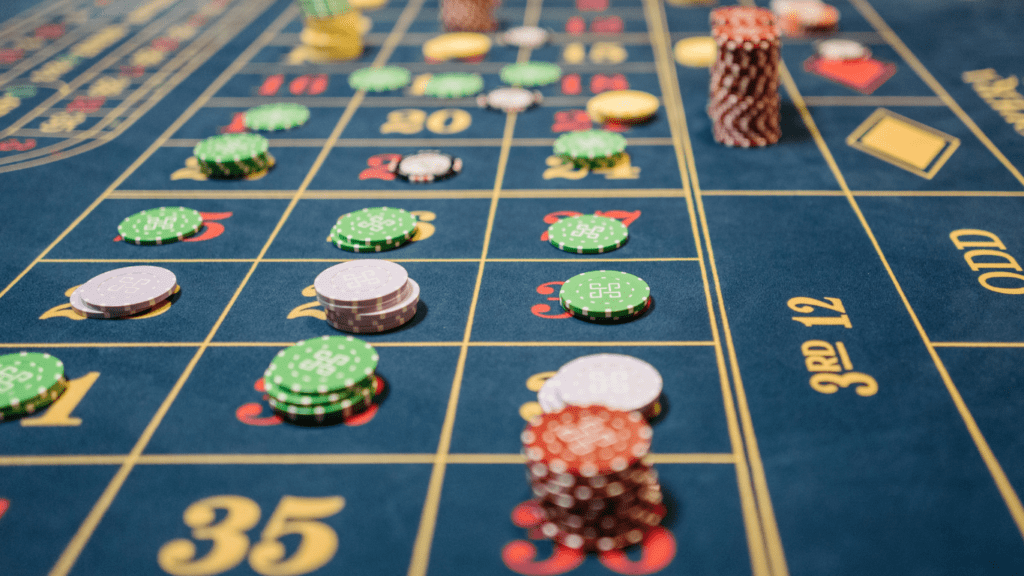Observing the casino layout is crucial. Casinos design their space to boost engagement, placing popular games near entrances and bars. Recognizing this layout aids in navigating and strategizing your gameplay. Slot machines might appear enticing, though they often have lower odds than table games.
Listening to sounds helps identify winning patterns. The ringing of slot machines or cheers at a roulette table signals potential areas of good fortune. Breezing through these cues sharpens awareness of where wins are happening frequently.
Interpreting casino atmosphere enhances decision-making. Casinos foster a lively ambiance to encourage spending; understanding this tactic aids in maintaining focus on personal game plans. Bright lights and captivating music mask the real time spent and money wagered.
Monitoring security protocols ensures a safe experience. Surveillance cameras and staff patrol most areas, ensuring fair gameplay. Knowing the presence of these measures provides peace of mind while enjoying gaming activities.
The casino environment, filled with strategic design and sensory stimuli, contributes significantly to the gambling experience. Keeping an informed perspective opens avenues to smarter play and increased winning chances.
Top 10 Tips for Winning Big at the Casino

Beating the odds at a casino involves more than just chance. With these strategic approaches, victory becomes more attainable.
- Start with a Budget
Set a budget before stepping into the casino, ensuring a clear financial limit. Respect this boundary to enjoy the experience without financial stress.
- Choose the Right Games
Select games with favorable odds and low house edges, like blackjack and craps. Research games before playing to maximize potential wins.
- Learn Basic Strategies
Use established strategies to improve game performance. Study approaches for popular games like poker and roulette to gain an advantage.
- Take Advantage of Bonuses and Promotions
Sign up for casino loyalty programs and track promotions. Free spins or bonus cash can boost your bankroll without extra spending.
- Know When to Walk Away
Recognize when to stop gambling, avoiding emotional decisions. Secure winnings by ceasing play while still ahead.
- Manage Your Bankroll Wisely
Divide your budget into session-specific amounts. Adhere to these allotments to control spending throughout your visit.
- Pay Attention to Payout Percentages
Research games’ payout percentages to identify those with better returns. Higher percentages typically indicate greater long-term winnings.
- Avoid Chasing Losses
Resist the urge to regain losses immediately, as this can lead to further expenditure. Focus on rational decision-making to maintain control.
- Stick to Your Limits
Set both time and financial limits to prevent excessive play. Use self-discipline to enjoy casino activities responsibly.
- Practice Makes Perfect
Enhance skills through practice, using online platforms or free game modes. Familiarity with games increases confidence and success.
Common Mistakes to Avoid
Understanding common pitfalls can improve a player’s casino experience. Avoiding these errors increases chances for success.
- Ignoring Bankroll Management: Players maximize longevity when they set strict budgets. Overspending leads to financial strain and diminished enjoyment.
- Chasing Losses: Continuously betting to recover prior losses often results in deeper deficits. Instead, knowing when to stop preserves both funds and morale.
- Skipping Basic Strategy: Players who neglect to learn basic strategies diminish their odds. For instance, understanding poker rankings or blackjack tactics enhances outcomes.
- Playing Without Research: Diving into a game without understanding its rules or odds works against the player. Informed choices, like opting for games with higher RTPs (Return to Player), improve success rates.
- Overindulging in Alcohol: Consuming too much alcohol impairs judgment and decision-making capabilities. Better decisions come from staying clear-headed.
- Betting on Emotions: Emotional decisions frequently lead to losses. Staying rational and adhering to predetermined strategies enhances decision quality.
- Neglecting to Take Breaks: Long sessions can lead to fatigue and costly mistakes. Taking regular breaks keeps a player sharp and focused.
- Falling for Gambler’s Fallacy: Believing that past outcomes affect future events often leads to misplaced bets. Each game round is statistically independent.
- Ignoring Promotions: Overlooking bonuses or loyalty programs results in missed opportunities for added value. Maximizing these offers stretches the bankroll.
- Social Distractions: Player focus declines when caught up in conversations or external entertainment. Staying attentive to the game keeps strategies intact.
]]>
Esports betting is an evolving arena involving skill, knowledge, and strategic insights. Understanding the landscape is crucial for increased success and improved odds of winning.
Popular Esports Titles to Bet On
Certain games stand out as favorites in the esports betting community due to their popularity and competitive scenes.
- League of Legends: Known for its global fan base and major tournaments like the World Championship, League of Legends offers consistent betting opportunities.
- Counter-Strike: Global Offensive (CS:GO): With numerous events throughout the year, CS:GO attracts bettors looking for frequent action and tactical gameplay.
- Dota 2: Renowned for its complexity and events like The International, Dota 2 presents high-stakes wagering options.
- VALORANT: As a newer entry, VALORANT rapidly gained popularity with well-organized tournaments, making it a betting favorite.
- Call of Duty: Regular competitions and a wide audience make Call of Duty appealing for those interested in team-based shooting games.
Types of Bets in Esports
Diverse bet types in esports cater to different strategies and preferences, requiring bettors to understand the complexity of each.
- Match Winner: This straightforward bet involves picking the team that will win a specific match.
- Handicap Betting: Offers a means to make a match balanced when there’s a clear favorite by assigning them a handicap.
- Total Rounds/Maps: In this bet, I predict the total number of rounds or maps played, irrespective of who wins.
- First Blood/First Kill: Bets placed on which team or player secures the first kill or achieves the first objective can introduce more nuanced strategies.
- Outright Winner: Involves picking the overall tournament winner, demanding an in-depth understanding of the teams’ performance levels.
Analyzing these components and mastering each aspect helps improve my betting odds strategically over time.
Strategies to Improve Your Odds

Betting on esports offers an array of possibilities, but effective strategies can greatly enhance your winning odds. Utilizing specific approaches helps in making informed betting decisions.
Analyzing Team Performance
I examine team performance by reviewing past match results and identifying winning patterns. Tracking metrics such as kill-death ratios and objectives achieved offers insights into a team’s current form. Head-to-head records against specific opponents reveal potential advantages or weaknesses. Analyzing this data provides a comprehensive understanding of a team’s capabilities and potential outcome in future matches.
Understanding Game Meta
Knowledge of the game meta is crucial. Each game evolves with updates, balancing changes, and shifting strategies, impacting team effectiveness. Staying updated on these changes is necessary to predict team and player adaptability. I follow game patches, developer notes, and community discussions to grasp the prevailing strategies that can dictate match outcomes. Recognizing favored characters or roles within the meta guides my betting choices.
Researching Player Histories
Individual player performance often influences match results. I explore player histories to gauge reliability and skill levels. Reviewing past tournament performances, recent form, and adaptability highlights valuable betting insights. Players often switch teams, impacting their synergy and effectiveness within their current lineup, so I consider these factors when assessing potential outcomes.
Managing Your Bankroll
Effectively managing your bankroll is crucial to success in esports betting. Consistent financial discipline helps minimize risk and sustain long-term participation in the betting scene.
Setting a Budget
Establishing a strict betting budget enhances decision-making by preventing impulsive wagers. I allocate a certain percentage of my disposable income specifically for betting purposes, making sure not to exceed this limit. This practice ensures that my financial obligations remain unaffected, even in cases of unexpected losses.
Avoiding Common Financial Mistakes
Many bettors encounter pitfalls by failing to stick to their budgets, chasing losses, or placing bets without sufficient knowledge. To avoid such errors, I assess each wagering opportunity based on its potential value and avoid investments driven by emotion rather than logic. By implementing strategic financial oversight, I effectively manage my resources and improve my chances of sustained success.
Finding Reliable Betting Platforms
Finding a reliable betting platform is crucial to ensuring safe and secure esports betting experiences.
Evaluating Platform Security
I always prioritize platform security. Secure platforms implement robust measures like SSL encryption to protect user data. It’s important to verify that a platform uses two-factor authentication, which provides an extra layer of security. Reading reviews from other users helps gauge the platform’s reputation, focusing on any security breaches or issues.
Checking for Licensing and Regulations
I make certain the platform is licensed and regulated by reputable authorities. Licensed platforms comply with:
- stringent regulations
- ensuring fair play
- transparency
To confirm legitimacy, I research whether the platform operates under well-known regulatory bodies like the Malta Gaming Authority or the UK Gambling Commission. Checking the platform’s license number provides an additional layer of verification.
The Importance of Responsible Gambling
Understanding responsible gambling is crucial for anyone engaged in esports betting. It’s not just about winning; it’s about maintaining a balance and ensuring that the experience remains enjoyable and within control.
Recognizing Problem Gambling
It’s vital to recognize when gambling habits become problematic. Common signs include betting more frequently or with higher stakes than planned, trying to recoup losses through further gambling, and feeling anxious or distressed when unable to place bets. When engaging with esports betting, I always suggest monitoring these behaviors and setting personal limits to prevent potential issues.
Seeking Help and Support
Seeking support is essential if gambling starts to negatively affect one’s life. Various resources and support networks, like hotlines and counseling services, offer assistance to those struggling with gambling habits. I’ve found that reaching out to these services early can provide valuable guidance and tools to manage gambling responsibly, ensuring that the fun of esports betting doesn’t lead to personal or financial distress.
]]>
Blackjack’s core involves simple rules and distinct card values. Knowing these elements forms the foundation for success.
Rules of Blackjack
Each round of blackjack, players aim to have a hand value closer to 21 than the dealer’s hand without exceeding it. Both players and the dealer start with two cards; one of the dealer’s cards is face-down. Players can choose to “hit” to take an additional card or “stand” to keep their current hand. Other moves include “double down,” where a player doubles their bet for one more card, and “split,” which allows players to separate pairs into two hands.
Card Values and Terminology
Card values in blackjack are straightforward. Number cards (2-10) equal their face value. Face cards (king, queen, jack) each hold a value of 10. Aces are unique, counting as either 1 or 11, maximizing flexibility in forming a hand. Terms like “bust” indicate exceeding a hand value of 21, while a “blackjack” signifies an ace and a 10-value card.
Strategies for Mastering Blackjack
Understanding the strategies that elevate your blackjack game transforms casual play into strategic expertise. Knowing the fundamentals isn’t enough; success comes from applying key techniques effectively.
Basic Strategy Chart
The basic strategy chart offers a statistical guideline for playing each hand optimally. This chart outlines the best decisions to make in every possible scenario to minimize the house edge. It’s my go-to resource, particularly when deciding whether to:
- hit
- stand
- double down
- split
For instance, if you hold a hand total of 12 and the dealer shows a 6, standing often provides the best chance of success.
Card Counting Techniques
Card counting adds another dimension to blackjack strategy. By tracking the ratio of high to low cards remaining in the deck, I can adjust my bets accordingly. Techniques like the Hi-Lo method track cards in a straightforward way. Each low card (2-6) is assigned +1, and each high card (10, J, Q, K, A) is assigned -1. By maintaining a running count, I gauge when the deck favors the player, allowing for strategic betting adjustments.
Betting Systems and Management
- Betting systems enhance the potential for winnings through structured patterns, though they don’t alter the odds of each hand.
- Approaches like the Martingale and Paroli systems center on increasing or decreasing wager amounts based on prior results.
- Alongside these systems, effective bankroll management ensures steady play without overextending.
- I set loss limits before each session to maintain control and keep the experience enjoyable.
Common Mistakes to Avoid

In blackjack, many players fall into traps that can diminish their chances of success. Identifying these pitfalls is crucial for improving one’s gameplay.
Overvaluing Hands
Players often misinterpret the strength of their hands, leading to poor decisions. Holding a hand like 16 against a dealer’s 10 tends to make players overconfident in the possibility of not busting by drawing a low card. This overconfidence impacts decision-making, often resulting in hits or stands that defy optimal strategy.
Misjudging Table Conditions
Misinterpreting the dynamics at the table can adversely affect outcomes. Players sometimes neglect to consider variables like dealer tendencies, table limits, or player count. For example, an increase in players leads to fewer hands being dealt per hour, which impacts betting systems relying on rapid progression like the Martingale. Understanding these conditions helps in tailoring strategies effectively to the table environment.
Enhancing Your Skills
To truly master blackjack and boost your winnings, focus on refining your skills through consistent practice and expert insights.
Practicing Online and Offline
Regular practice strengthens decision-making and familiarity with blackjack strategies. I utilize online platforms, benefiting from the flexibility and variety of games available without financial risk. These virtual settings often provide tutorials and simulated games that help me refine strategies. When offline, I seek out local casinos or friendly games to apply these skills in real-world scenarios. This combination of online and offline practice enables me to adapt strategies and improve my gameplay.
Seeking Professional Guidance
Gaining insights from professionals elevates my understanding of blackjack. I research books and online courses by renowned blackjack experts to expand my knowledge of advanced strategies and techniques. Attending workshops or seminars offers opportunities to engage with seasoned players, discussing tactics and experiences. This professional guidance provides valuable perspectives, enhancing my skills and boosting confidence at the table.
Legal and Ethical Considerations
Playing blackjack involves more than just employing strategies to win; it’s also important to understand and adhere to the legal and ethical standards that govern the game.
Understanding Casino Rules
Each casino has its own set of rules for blackjack, which can affect gameplay and strategy. Familiarizing myself with these rules is crucial before joining a table. House policies often cover table limits, deck counts, and specific game variations, like whether the dealer hits on a soft 17. Additionally, some casinos use continuous shuffling machines that make card counting less effective. By being aware of these details, I optimize my strategy for each casino setting.
Ethical Card Counting Practices
Card counting isn’t illegal in most jurisdictions, but casinos frown upon it and may ban players suspected of using it. Rather than focusing solely on card counting, I emphasize its ethical practice as part of a broader strategic approach. This means blending in with typical players, avoiding large, noticeable betting swings, and maintaining a respectful demeanor towards casino staff. Playing ethically not only helps me avoid complications but also ensures a positive reputation in gaming circles.
]]>
Poker tournaments offer exciting opportunities for players to showcase their skills and win big prizes. Knowing the different formats and structures is crucial for success.
Types of Poker Tournaments
In poker tournaments, players encounter various formats, each with unique dynamics. Multi-Table Tournaments (MTTs) involve large player fields across multiple tables. Players compete until one remains. Sit & Go Tournaments start when enough players join, usually at one table. Players like these for their quick tempo. Turbo and Hyper-Turbo events increase the pace with faster blind levels. In Bounty and Knockout tournaments, players earn prizes for eliminating opponents, providing extra motivation.
Key Rules and Structures
- Poker tournament structures define play dynamics and influence strategies.
- Players begin with equal chip stacks, unlike cash games where they buy in at different levels.
- Blinds increase at regular intervals, creating pressure and influencing tactics.
- Different formats feature varying blind structures. Some have slow increases with deep stacks, while others use fast-paced structures with shallow stacks.
- Rebuy tournaments allow additional buy-ins within a specific period, increasing the prize pool. Offers like these add layers of strategy, as players consider the cost and benefits of rebuying.
- Understanding these elements helps players make informed decisions and adapt strategies to optimize their performance.
Preparing for a Tournament
Before entering a poker tournament, I focus on preparation, which combines strategy development and financial planning.
Building a Solid Strategy
I analyze past performances and study successful players to understand effective strategies. Identifying the most common hands I might face helps me prepare for various scenarios. Creating a flexible game plan ensures I can adapt to different opponents and situations. Reviewing player tendencies enhances my ability to make strategic decisions on the fly.
Managing Your Bankroll
Effective bankroll management safeguards my financial resources during tournaments. I allocate a specific budget for entry fees to avoid overspending. By setting aside funds for unforeseen expenses, I maintain stability throughout the tournament. Understanding the importance of variance helps me stay composed during inevitable swings, enabling better long-term success.
Game Day Essentials
Success in poker tournaments involves more than just skill and strategy. Preparation plays a key role in securing top prizes.
Mastering the Blinds and Ante
Recognizing the impact of blinds and antes on your chip stack is vital. Blinds increase at regular intervals, creating pressure. Adapt your strategy by playing more aggressively as blinds rise. Set a plan for when to loosen up or tighten your play based on your stack size compared to the blinds. Use position to your advantage; players in late positions can take calculated risks to steal blinds more often. Always track the blind level and adjust your play aggressively to maintain or improve your position.
Reading Your Opponents
Accurate reads on opponents enhance strategic decision-making. Observe betting patterns and facial expressions for tells. Identify tight and loose players to adjust your tactics accordingly. A pattern of conservative play indicates strength, while erratic betting suggests bluffing. Use this information to decide when to play pots or fold weak hands. Exploit weaker players by targeting them with calculated aggression. Stay adaptable, as seasoned opponents will also try reading you.
Advanced Strategies for Winning

Mastering advanced strategies elevates a player’s game in poker tournaments. Incorporating bluffing and understanding position offer crucial advantages.
Bluffing and Deception Techniques
Mastering bluffing shifts tournament dynamics. I use bluffs selectively, ensuring timing and table image align. Observing opponents helps me identify when they’re vulnerable to deception. I vary my playstyle to keep others uncertain, combining my insights on player tendencies with calculated risks. During tight table conditions, I’m more likely to bluff against cautious players who fold easily under pressure.
Utilizing Position to Your Advantage
Position dictates control in poker. I leverage my position by adjusting my strategy based on proximity to the button. In later positions, I gather information from previous actions and make more informed decisions. I capitalize on weaker positions by playing aggressively when it benefits me, often stealing blinds and forcing opponents out of their comfort zone. By understanding table dynamics, I maximize the benefits of favorable positions to exploit opponents’ weaknesses.
Staying Mentally Focused
Playing poker tournaments requires maintaining mental focus amidst pressure and setbacks. It’s critical to develop methods that enhance concentration and resilience throughout the game.
Handling Pressure Situations
In poker tournaments, pressure situations occur when significant pots are at stake or nearing the bubble. I manage pressure by controlling my breathing and visualizing successful outcomes before acting. This approach fosters:
- calm mindset
- reducing anxiety
- helping me make rational decisions
Recognizing the patterns and tendencies of opponents also aids in deflating stress, as I prepare better responses to their moves.
Recovering from Setbacks
Experiencing setbacks, like losing a crucial hand, is inevitable in poker. I focus on staying composed, analyzing mistakes without dwelling on them. Revisiting hand histories augments my ability to learn from errors and refine my strategies. Moreover, setting short-term goals during the tournament helps me stay motivated and shifts my focus away from the past, ensuring I tackle each new hand with a refreshed mindset. Achieving mental clarity keeps me poised to seize future opportunities.
]]>
Online slot machines attract gamers with their vibrant graphics and enticing themes. Grasping how these games function is key to crafting effective strategies.
How Online Slots Work
Online slots operate through Random Number Generators (RNGs), ensuring every spin’s outcome is independent and random. This electronic mechanism replaces mechanical reels in traditional slot machines. By generating sequences that can’t be predicted, RNGs maintain fairness and provide a genuine gambling experience. Players select their wager and spin the reels to try aligning symbols across paylines, which vary in number depending on the game.
Types of Online Slot Machines
Several types of online slots cater to different tastes:
- Classic Slots: These mimic traditional machines with three reels and simple symbols like fruits and bars.
- Video Slots: With five or more reels and engaging themes, these slots feature animations and bonus rounds that enhance gameplay.
- Progressive Slots: Offering life-changing payouts, these slots pool bets from multiple players to build substantial jackpots.
- 3D Slots: Boasting advanced graphics, these slots provide an immersive experience that’s visually stunning.
- Branded Slots: Inspired by popular media franchises, these slots appeal to fans of movies, music, and TV shows.
Recognizing these types helps players choose games aligning with their preferences, maximizing entertainment and potential wins.
Key Factors to Consider
When diving into online slot machines, understanding crucial elements boosts both enjoyment and winning potential. Focusing on factors like RTP rates and volatility equips players with necessary insights.
Return to Player (RTP) Rates
RTP signifies the percentage a slot game returns to players over time. For example, a game with a 96% RTP returns $96 for every $100 wagered. Opting for slots with higher RTP rates can improve long-term returns. Many online casinos provide RTP information within the game’s details, making it easy to compare options.
Volatility and Variance
- Volatility, also known as variance, describes a slot game’s payout frequency and size.
- High volatility slots offer larger but less frequent wins, catering to risk-takers.
- Conversely, low volatility games provide smaller, more regular payouts, appealing to those seeking steady returns.
- Understanding volatility allows players to align slot choices with their risk tolerance and gaming style.
Effective Bankroll Management

Managing my bankroll effectively allows me to extend my playtime and increase my chances of winning. By setting a budget and choosing bet sizes wisely, I ensure a balanced gaming experience.
Setting a Budget
I always establish a budget before playing online slots. This practice helps me control my spending and prevents me from chasing losses. I evaluate my finances and determine an amount I’m comfortable losing, viewing it as entertainment expense. This approach ensures that my gaming remains enjoyable without financial stress.
Choosing Bet Sizes Wisely
I carefully select my bet sizes to match my budget. Betting small amounts, especially in games with higher volatility, allows me to conserve my bankroll and play longer sessions. In contrast, I might increase my bet size temporarily in low volatility games where the payout frequency is higher. This strategy maximizes my entertainment value and aligns with my risk tolerance.
Strategies for Maximizing Winnings
Increasing winnings in online slot machines involves applying informed strategies to gameplay. By evaluating slot choices and leveraging available incentives, players can enhance their chances of success.
Selecting High-Paying Slots
Choosing slots with high Return to Player (RTP) rates is key. I always look for slots with RTPs of at least 96%, as these offer better long-term payouts. Understanding volatility is crucial too. While high-volatility slots offer larger payouts, they come less frequently compared to low-volatility slots that pay out smaller amounts more regularly. I match my choice with my risk tolerance for optimal entertainment and rewards.
Using Bonuses and Promotions
Maximizing bonuses and promotions boosts overall gains. Online casinos often provide welcome bonuses, free spins, and cashback offers to attract players. I ensure to read the terms and conditions carefully to meet wagering requirements before withdrawing winnings. Regularly checking for new promotions and using loyalty programs also adds value to my gaming experience, enhancing potential returns at no extra financial cost.
Common Mistakes to Avoid
Understanding common pitfalls helps improve your online slot gaming experience. I address these errors to guide you toward more successful play.
Chasing Losses
Continually playing to recover losses just exacerbates financial setbacks. Maintaining discipline instead of increasing bets after a loss protects your bankroll. In previous experiences, I’ve witnessed players fall into the trap of emotional play under the misconception that persistence yields imminent wins. Recognizing that each spin is independent due to RNGs prevents costly decisions driven by frustration.
Ignoring Slot Rules
Each slot game comes with specific rules that impact your gameplay strategy. Overlooking these can lead to missed opportunities for maximizing returns. Pay attention to paytables and bonus features because understanding these elements equips you to make informed choices. For instance, failing to meet minimum bet requirements for jackpots leads to missed chances for larger payouts. Ensuring familiarity with the game’s terms allows you to leverage features like free spins, multipliers, and bonus rounds effectively.
]]>
High stakes gambling involves playing with large sums of money in environments known for their potential to yield substantial returns or dramatic losses. I find that it’s reserved mostly for those seasoned in risk assessment and strategy implementation.
Definition and Importance
In high stakes gambling, players wager significant amounts in games like:
- poker
- blackjack
- baccarat
at exclusive tables. While the financial commitments are greater, so are the potential rewards. It’s crucial for these players to employ sound strategies to manage their bankroll effectively and sustain prolonged gaming sessions.
Key Differences from Regular Gambling
High stakes gambling diverges from regular gambling primarily in the scale of bets and the player experience level required. Large sums and strategic acumen define high stakes scenarios, whereas casual gambling often involves smaller bets and less strategic depth. Players at high stakes tables typically engage in thorough game analysis and leverage advanced tactics to enhance their probability of winning.
Strategies to Win Big
Winning big in high stakes gambling requires more than luck; it’s about strategic planning and decision-making.
Bankroll Management
- Inadequate bankroll management leads to significant losses.
- Fixed budgets prevent overspending and force strategic betting.
- Allocating a percentage (e.g., 5%) of my bankroll for each bet allows consistent gameplay without depleting funds quickly.
- Regularly reviewing my financial status informs adjustments in betting strategies, maintaining control over spending and avoiding impulsive decisions.
Game Selection
Selecting the right game enhances my chances of winning. Informed choices arise from understanding my strengths and weaknesses across different casino games, such as poker or blackjack. Analyzing house edges helps identify games where my skills give me an advantage. Practicing these games outside high stakes environments sharpens my skills and boosts confidence before entering high roller tables.
Understanding Odds and Probability
Comprehending odds and probability is crucial to informed decision-making. Assessing the odds of each game and each hand or round allows strategic risk-taking. Familiarizing myself with probability patterns in games like baccarat or roulette guides my betting choices. Calculating potential outcomes helps me make decisions that increase my chances of substantial wins while minimizing potential losses.
Risks and How to Avoid Big Losses

High stakes gambling can lead to significant financial risk, requiring strategies to minimize potential losses.
Common Pitfalls
- Players often overlook the impact of chasing losses.
- This instinct can severely damage funds, leading to impulsive and risky decisions.
- Many fall prey to the illusion of patterns in games of chance, which can result in irrational bets based on perceived luck.
- Another common mistake is overconfidence, particularly after a series of wins, which may prompt larger, riskier bets.
Emotional Control and Discipline
Remaining calm and composed is crucial in high stakes gambling. Emotional decisions tend to cloud judgment, leading to quick and costly losses. Techniques such as deep breathing or stepback pauses improve focus and reduce impulsive reactions. By maintaining discipline, players can adhere to their established strategies and avoid costly deviations from their plan.
Setting Limits and Knowing When to Quit
Establishing clear spending caps improves financial oversight and reduces exposure to loss. Monitoring these limits ensures players stop when losses exceed acceptable thresholds. Equally important is the ability to recognize winning streaks. Quitting while ahead secures profits and prevents falling back into the cycle of potential loss.
Legal and Ethical Considerations
Navigating the legal and ethical landscape is crucial in high stakes gambling. Understanding regulations and practicing responsible gambling ensures an enjoyable and compliant experience.
Regulation and Compliance
Gambling laws differ globally, so it’s important to familiarize yourself with local regulations. In many jurisdictions, regulatory bodies oversee casino operations to ensure fairness and transparency. For instance, the UK Gambling Commission and Nevada Gaming Control Board set strict guidelines. Always choose licensed venues or platforms to avoid legal troubles and ensure fair play.
Responsible Gambling Practices
Responsible gambling involves setting personal boundaries and sticking to them. Establishing betting limits and never wagering more than you can afford to lose helps maintain control. Recognizing the signs of problem gambling, such as chasing losses or neglecting responsibilities, is equally important. Taking breaks and seeking support from organizations like Gamblers Anonymous can aid in maintaining healthy gambling habits.
]]>
Poker demands more than luck; mastering the fundamentals sets a solid foundation for long-term success.
The Rules of Poker
Poker rules vary slightly across different variants but share a common framework. Players aim to win chips by either holding the best hand or convincing others to fold. A standard game, like Texas Hold’em, begins with two hole cards per player and five community cards on the table.
Participants use these to form the best five-card hand. Rounds of betting ensue after the deal, flop, turn, and river. Understanding betting rounds and card combinations ensures effective play. Knowing how to raise, call, fold, or check as per the strength of one’s hand and position is key during each round.
Hand Rankings and Their Importance
Hand rankings determine poker’s outcome and strategy. The hierarchy begins with the high card and progresses to:
- pairs
- two pairs
- three of a kind
- straights
- flushes
- a full house
- four of a kind
- straight flush
- ?royal flush
Recognizing these rankings speeds up decision-making. A flush beats a straight, highlighting the importance of learning each ranking’s value. This knowledge aids in forming better hands and anticipating opponents’ potential holdings, a skill essential for professional-level play.
Essential Poker Tactics

Mastering essential poker tactics enhances your ability to outplay opponents and secure substantial wins. Applying precise strategies improves decision-making and increases success rates.
The Art of Bluffing
Bluffing, a crucial tactic in poker, deceives opponents into acting against their best interests. To execute a successful bluff, select the right moment and evaluate your table image and opponent tendencies. Timing becomes pivotal–avoid regular bluffs to maintain unpredictability. Recognizing opponents’ hand strength indicators helps refine bluffing strategies. Limit bluffs to scenarios where your hand plausibly beats the opponent’s hand.
Reading Your Opponents
- Accurate reading of opponents’ behavior and betting patterns provides a competitive edge.
- Observe physical tells like nervousness or confidence, while online games require attention to betting durations and frequency.
- Identify whether opponents play aggressively, passively, or unpredictably.
- Adapting to these observations, craft tactics that exploit their weaknesses.
- Understanding these behavioral patterns allows you to anticipate moves, making informed decisions that leverage opponents’ vulnerabilities.
Advanced Strategies for Winning
Professional poker players employ advanced strategies to gain an edge over their opponents. Understanding these tactics can significantly enhance my gameplay, leading to bigger wins.
Position Strategy
The position is crucial in poker, providing insights into opponents’ actions before it’s my turn. Playing in late positions, such as the button or cutoff, offers the best advantage since I can observe opponents and make more informed decisions. Early positions require a tighter playing style as fewer clues are available about opponents’ intentions. By recognizing the benefits of acting last, I can bluff more effectively and make strategic bets based on prior actions at the table.
Mastering Betting Patterns
Analyzing betting patterns reveals valuable information about opponents’ hands and strategies. I pay close attention to the size and frequency of opponents’ bets, enabling me to deduce hand strength and adjust my tactics accordingly. For instance, a consistent large bet might indicate a strong hand, while small repetitive bets could suggest weakness or draw attempts. By recognizing these patterns, I can decide when to fold, call, or raise, optimizing my chances of winning the pot.
Tools and Resources for Poker Players
Professional poker players rely on various tools and resources to sharpen their skills and gain an edge over opponents. I explore some essential platforms and educational materials that enhance gameplay.
Online Platforms and Software
Online platforms and software enable analysis and strategy improvement. I utilize tools like PokerTracker and Hold’em Manager, which provide detailed insights into playing patterns and help refine strategies. These platforms offer features such as hand histories and player statistics, aiding in identifying areas for improvement. I also take advantage of GTO solvers, like PioSolver, to study game theory optimal strategies and optimize decision-making.
Books and Courses
Books and courses serve as foundational resources for expanding poker knowledge. I recommend seminal books like “The Theory of Poker” by David Sklansky and “Super/System” by Doyle Brunson, which provide deep insights into poker strategy and decision-making psychology. For a structured learning experience, I’ve found online courses from experts like Jonathan Little highly valuable; they offer video lessons, quizzes, and practice hands to reinforce concepts.
Common Mistakes to Avoid
Navigating the complexities of poker requires skillful avoidance of common pitfalls. Identifying and correcting these mistakes boosts your winning potential.
Overplaying Hands
Many players overestimate the strength of their hands. For example, holding pocket aces can lead to aggressive betting, but if the board reveals a potential straight or flush, caution is wise. Assess each situation based on community cards and opponent actions. Avoid being overly aggressive with top pairs, especially when opponents signal stronger possibilities.
Ignoring Table Dynamics
Neglecting table dynamics compromises strategy formulation. Each table has unique players and behaviors that impact decisions. Observe opponent tendencies and adjust your gameplay accordingly. Not adapting to aggressive or passive tables results in missed opportunities. Stay aware of shifting dynamics, including players’ positions and betting patterns, to optimize strategic decisions.
]]>
Gambling bonuses serve as an incentive to increase potential profits, turning them into vital assets for any player.
Types of Gambling Bonuses
There are several types of gambling bonuses, each designed to enhance your gameplay.
- Welcome Bonuses: New players often receive these upon registration and deposit. They commonly match your initial deposit up to a certain percentage, like 100% or more, boosting your starting bankroll significantly.
- Free Spins: Slot enthusiasts can benefit from these, which provide a number of free turns on slot machines, increasing your chances for a payout without additional risk.
- Cashback Offers: These bonuses return a percentage of your losses over a set period, effectively cushioning the financial blow and allowing for continued play with reduced risk.
- No Deposit Bonuses: Casinos offer these bonuses without requiring an initial deposit, allowing you to try their offerings risk-free.
Terms and Conditions
Always scrutinize bonus terms and conditions to fully benefit from them.
- Wagering Requirements: Many bonuses come with wagering requirements, meaning you must bet a certain amount before withdrawing winnings from bonus funds. For example, a 30x playthrough on a $100 bonus means you must wager $3,000.
- Game Restrictions: Some bonuses apply to specific games only; using them on eligible games maximizes your potential returns.
- Expiry Dates: Bonuses typically have a time limit. Use them before they expire to avoid losing potential gains.
- Maximum Bet Limits: While playing with bonuses, there may be bet size maximums. Exceeding these limits could forfeit your bonus and related winnings.
Choosing the Right Bonus

Selecting the most advantageous bonus is critical in enhancing gambling success. Players benefit greatly by assessing multiple factors before committing to an offer.
Evaluating Bonus Offers
Not all bonuses offer equal value. I look at the wagering requirements, which determine how many times the bonus amount must be bet before withdrawing. Terms with low requirements are favorable. Game contributions vary; for example, slot games often contribute 100%, while table games contribute less. Checking for any evidence of exclusion is essential, as certain games or platforms might not be eligible. Expiration dates are important. Understanding timeframes ensures I can fully use a bonus before it lapses.
Comparing Online Casinos
Different casinos offer varied bonus structures. I compare offers, analyzing both the size and type of bonus, such as deposit matches or free spins. Reputation is key; I read reviews and check licensing information to ensure credibility. Casinos with a history of prompt payments and transparent policies are preferable. Additionally, I contact customer service to gauge responsiveness, as swift support can often signal a reliable platform.
Strategies to Maximize Winnings
Optimizing gambling bonuses requires a strategic approach. With the right techniques, it’s possible to increase potential returns significantly.
Bankroll Management
Effective bankroll management enhances the value of gambling bonuses. I allocate a specific amount for betting sessions and stick to it, ensuring I don’t exceed it. By setting deposit limits, I maintain control and prevent overspending. This approach ensures I maximize my bonus value by having funds consistently available for wagering without risking financial strain.
Playing Low House Edge Games
Selecting low house edge games increases bonus efficiency. I prefer games with a lower house advantage like blackjack or baccarat, which offer greater chances of higher returns on my bets. While slots contribute 100% to wagering requirements, I balance them with skill-based games to optimize my winnings. By focusing on low edge games, I strategically use bonuses for a better payout potential.
]]>